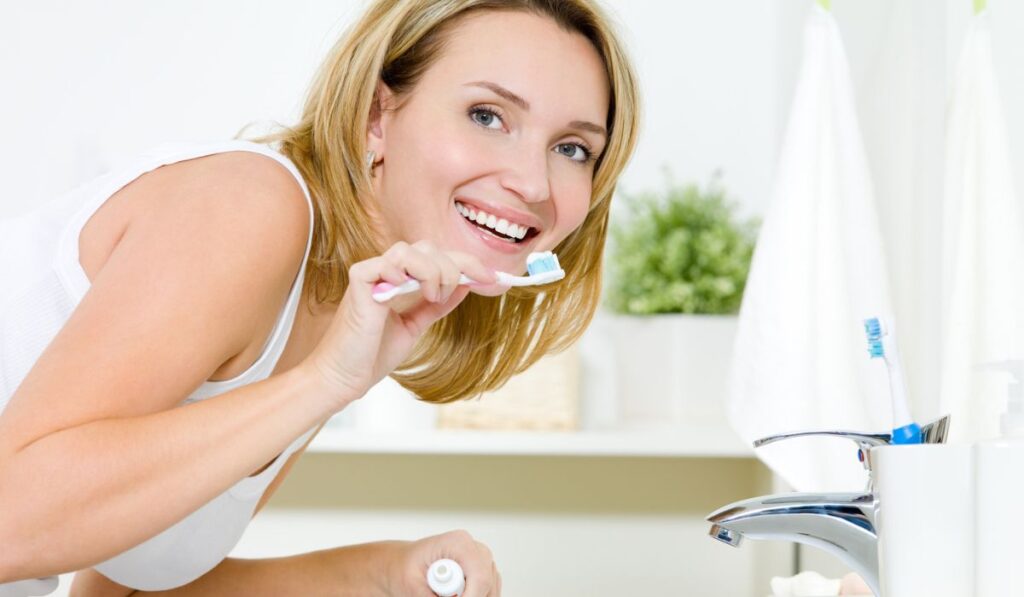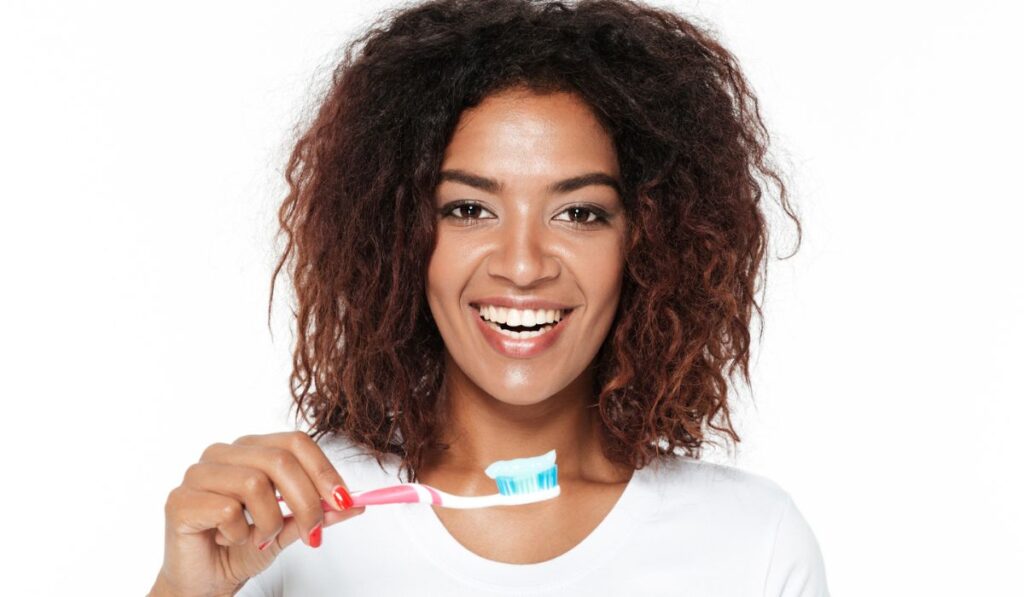Oral hygiene offers many benefits to your health and can boost your confidence. First, the most apparent benefit of brushing your teeth is preventing gum disease and cavities, eliminating the most common dental problems. Second, brushing your teeth keeps a bright smile, as you can brush away stains that would eventually cause discoloration.
While you can still clean your teeth without toothpaste and have them be healthy, it’s recommended to use toothpaste as it contains abrasives that remove stains faster, helps in fighting cavities, and gives you fresh breath.
With more people learning about the different ingredients included in toothpaste, there have been legitimate concerns over the safety of most toothpaste brands. This has led people to prefer alternatives or even brush their teeth without toothpaste. You can use a homemade alternative that does not contain all the chemicals you find in mainstream toothpaste brands.
Do You Really Need Toothpaste?

Healthy gums are the foundation for good oral health. Many people choose toothpaste if it promises to maintain their teeth strong and clean.
While you can brush without toothpaste, there are several benefits you can get by finding the right brand. Brushing alone can remove plaque, but if you want the extra benefits, you must choose the right toothpaste.
Gently Whitens Teeth
When you remove surface stains, you can restore your teeth to their natural white color. The right toothpaste will contain ingredients that break down stubborn stains and abrasives that leave the surface sparkling clean. If you want a bright smile, embrace a combination of the right toothpaste and regular brushing.
Strengthens the Enamel
Your tooth enamel is the outer layer that keeps the teeth white and protects against tooth decay. Acids in the food you consume can wear the enamel, so brushing regularly can protect your teeth against damage. In addition, most toothpaste brands contain fluoride, which strengthens the enamel and helps to repair the damage.
Freshens Your Breath
Another reason you need to use toothpaste is to achieve fresh breath. Bacteria in plaque can contribute to bad breath, also called halitosis.
When you brush twice a day, you can remove plaque. Also, some toothpaste brands contain a minty flavor, which gives you a fresh breath.
Keeps Your Gum Seal Tight
Bacteria and plaque buildup can cause bleeding gums. Toothpaste contains ingredients targeting plaque and bacteria that build up along the gum line. In addition, by brushing regularly, you will help keep the seal between the gums and teeth tight.
Reduces Inflamed Gums
Healthy gums should have a coral shade of pink. Because of plaque buildup, the bacteria are not removed when regularly brushing without toothpaste. Using toothpaste, you can get protection for your gums and ensure they’re healthy to prevent inflammation.
Prevents Bleeding Gums
If your gums are healthy, they will not bleed every time you brush. Bleeding can be a sign there’s a buildup of plaque along the gum line. Regular brushing using toothpaste can remove plaque bacteria and prevent bleeding gums.
Can You Brush With Just Water?
Your teeth are the gateway to a beautiful smile. Some types of toothpaste contain brightening and whitening ingredients, guaranteeing a bright smile.
However, some people have concerns about poisonous ingredients used in toothpaste, so they stay away from most toothpaste brands or choose to brush with only water.
The real question about brushing with only water is whether this is safe. Brushing with only water is safe unless the water is contaminated. While you can remove most of the plaque without toothpaste, you still miss out on some of the benefits of using toothpaste.
Using Toothpaste
Good toothpaste brands, such as Sensodyne Complete Protection (on Amazon) or Tom of Maine Whole Care Natural Toothpaste (on Amazon), combine a mild abrasive, antiseptic, and fluoridation to clean and protect your teeth against damage.
To know why you should not always brush with water only, it’s essential to appreciate the reason toothpaste contains fluoride. These are among the most critical ingredients for good oral health care. It helps prevent tooth decay, which in turn remineralizes early cavities.
Topical toothpaste contains antibacterial ingredients like triclosan, which reduces gingivitis. Also, fluoride helps reduce tooth sensitivity, which often happens if you eat poorly or have a genetic condition that leads to soft tooth enamel.
Not Using Toothpaste
It’s okay to brush your teeth without toothpaste, as the toothbrush is the most important instrument when brushing your teeth. However, one of the concerns people have about not using toothpaste is that they might not remove dental plaque effectively.
While toothpaste accelerates these benefits, dental plaque is just a sticky film of sugar and bacteria on your teeth, which can be removed with the toothbrush’s bristles. So, if you use the toothbrush and water, you can still prevent tooth decay.
But if you want those extra benefits of sparkling clean teeth, you might want to add toothpaste to your brushing routine. Also, only the toothbrush and water cannot get rid of bad breath. If you choose to brush without toothpaste, you should also ensure your diet is healthy and low in sugar.
What Causes Cavities?
Cavities are damaged areas on your teeth surface that become tiny openings or holes. Also called tooth decay, cavities are caused by different factors, including the buildup of bacteria in the mouth, sipping sugary drinks, frequent snacking, and not cleaning teeth well.
If not treated, cavities will get larger and can affect the deeper layers of your teeth. Also, they can lead to tooth loss, infection, and severe toothache. Therefore, it’s crucial to maintain regular dental visits. In addition, brush and floss your teeth to ensure protection against the formation of cavities.
Some of the symptoms of cavities include:
- Mild to sharp pain when drinking or eating something hot, cold, or sweet.
- Tooth sensitivity.
- Spontaneous pain that occurs without a cause.
- Black, brown, or white staining on the surface of the teeth.
- Visible pits or holes in the teeth.
How to Prevent Cavities
Because cavities permanently damage the teeth, the best solution is to prevent their occurrence. These are some of the things you can do to prevent cavities from forming:
Regular Brushing with the Right Toothbrush
This is an obvious tip to prevent cavities. Your mouth is home to microbes that recycle what you eat. Unfortunately, this is how they cause tooth decay, as they feed on the sugars in your food to grow and leave behind waste, which becomes dental plaque.
The plaque allows the microbes to stick around the teeth longer, producing acids that wear down your teeth and cause cavities. By brushing your teeth, you get rid of plaque and bacteria.
This is one of the simplest solutions that will help you prevent cavities. Colgate 360 Total Soft Tooth Brush (on Amazon) and Gondola Bamboo Toothbrush Set (on Amazon) are both excellent choices.
Cut Back on Acidic Drinks and Sugar
It can be tempting to consume lots of coffee and tea, but prolonged exposure to acidic coffee and tea containing sugar and milk can raise the risk of cavities.
While it’s not a bad idea to enjoy your cup of coffee, keep it below 20 minutes, and when done, rinse your mouth. Sugar is among cavity-causing additives that you should restrict in your diet.
Embrace Flossing
Flossing helps to reach those areas of your teeth that the toothbrush does not reach. Your teeth have five sides, and all should be cleaned regularly. However, even when you brush twice a day, you only clean three of those sides, so flossing completes the job.
Can You Prevent Cavities Without Fluoride?

To prevent cavities, you don’t always need to rely on brushing with fluoride toothpaste. Instead, there are many preventive measures you can embrace to improve your oral hygiene.
First, when you eat sugar, it’s always advisable to rinse with clean water. Rinsing removes left-behind residue and bacteria. While rinsing, use filtered water instead of tap water, as most water sources are treated using fluoride.
A nutritious diet is also a good way to maintain good oral health. What you eat plays a role in your oral health and how you feel. You can keep your oral health intact when you consume a diet high in nutritious vegetables, fruits, and grains. This protects against gum disease and tooth decay.
Also, drink plenty of water to keep the mouth hydrated, as this naturally washes away acids and sugars that contribute to tooth decay.
In addition to efforts to maintain good oral hygiene and a healthy diet, you also need to visit a dentist. Regular visits will help you keep your gums and teeth in good health. In addition, the dentist can spot weak spots early and advise on the proper remedies.
Conclusion
Maintaining good oral health has many benefits, including a beautiful smile. You can avoid problems like tooth decay if you embrace brushing your teeth regularly.
While you can brush without toothpaste, for the added benefits and to ensure excellent cleaning, it’s important to find toothpaste with the right ingredients.
